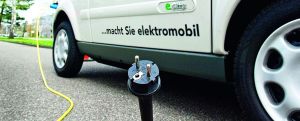The Baden-Wuerttemberg “LivingLab BWe mobil“ is one of four concepts to be funded under the Electric Mobility Showcase Program in Germany. The Federal Republic of Germany will provide funds in the amount of EUR 180 million for the complete program in four regions of Germany. Karlsruhe Institute of Technology (KIT) assumes a leading role in the LivingLab BWe mobil concept with projects relating to an electric campus fleet and to the “E-Traffic Space Stuttgart”. KIT is the project partner in another two proposals.
Today’s decision of the federal government is based on the recommendations of a jury of 13 scientists and representatives of expert associations. The decision will now be followed by a procedure, during which the funding volumes will be specified for the individual projects.
Under the “KIT Campus Fleet” project, it is planned to use more than 40 electric vehicles for transports from and to the KIT premises as well as for regional traffic: 30 electric cars, ten electric bikes, three vans, and one passenger van will complement the car pool existing at KIT. KIT’s service staff will be responsible for the operation and maintenance of the vehicles. “Setup of a campus fleet at KIT reflects the high relevance of our research and development activities in this field. KIT wants to show what it means to be electromobile,” emphasizes KIT Vice President Dr. Peter Fritz. The fleet also includes the electric racing car that is built and successfully run in car races by the KA-RaceIng students group. Under the “KIT Campus Fleet” project, trainees will be given the opportunity to pass advanced training in the field of electric mobility.
KIT also assumes a leading role in the project “E-Traffic Space Stuttgart”. This project is aimed at embedding electric mobility in modern mobility and traffic concepts. It is planned to extend existing traffic models. So far, concepts in this field have been lacking in Germany. The project will focus on the densely populated region of Stuttgart, where the effect of electric vehicles in traffic, i.e. traffic volume, traffic flows, and traffic behavior, can be studied very well. In addition, it is planned to record the movement profiles of electric vehicles under the showcase project. Finally, the results of the project will be incorporated in the traffic plan of the region of Stuttgart in agreement with the traffic and urban planning departments and may even be transferred to other regions in Germany.
KIT also participates in the border-crossing project “RheinMobil” that will demonstrate economic efficiency of electric vehicles by studies based on commuters between the regions of Baden and Alsace. The “Electric Mobility at School” project with KIT as a partner is aimed at including the topic of electric mobility in the education program of schools in Baden-Württemberg.
Coordinated by the State Agency for Electric Mobility and Fuel Cell Technology, e-mobil BW GmbH, and the Stuttgart Region Economic Development Corporation (WRS), the showcase region of Baden-Württemberg focuses on the region of Stuttgart and the city of Karlsruhe. About 120 partners have joined 41 individual projects. The overall project volume amounts to EUR 153 million. By the end of 2015, more than 3100 electric vehicles are planned to be in use. Apart from the Baden-Württemberg concept, the Federal Republic will fund the projects in Berlin/Brandenburg, Lower Saxony, and Bavaria/Saxony.
In close partnership with society, KIT develops solutions for urgent challenges – from climate change, energy transition and sustainable use of natural resources to artificial intelligence, sovereignty and an aging population. As The University in the Helmholtz Association, KIT unites scientific excellence from insight to application-driven research under one roof – and is thus in a unique position to drive this transformation. As a University of Excellence, KIT offers its more than 10,000 employees and 22,800 students outstanding opportunities to shape a sustainable and resilient future. KIT – Science for Impact.

